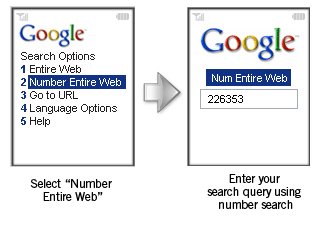Google has breathed the first gust of air into its master mobile plan. It has spoken the simple, unassuming words ' spell with keypad ' and, without knowing it, millions of mobile phone users have been audience to Google's quiet initiation into the greatest technological revolution that the world has ever seen. What is so significant about those three words? On Google's
cheatsheat page for GOOG-411, the free (ad-supported) directory assistance service launched by Google, it discusses the option for users to enter a business name or category by using the cell phone keypad. The exact prompt, after you call 1-800-GOOG-411 and utter a city and state and press 1, is:
To spell the business name or category using your keypad just enter one number for each letter. For example, to spell Taxi, you'd enter 8-2-9-4 and just leave out spaces and punctuation.
Folks, this is no normal text messaging. This is the world of wordnumbers. Google wants you to ' spell with keypad ' by pressing each key just once. Press the number equivalent of each letter you want to spell with and, tada! Google uses on its web cheatsheet the example of 'TOYS would be 8697.' In this case, the 8697 is the wordnumber for Toys. The actual domain 8697.com would be the dot com wordnumber.
So what's the big whoop? Firstly, Google is actively using its Google Number Search (GNS) technology in an active application (finally). Google Number Search was a mobile search experiment that enabled users to search the internet using wordnumbers. Google shut down GNS in 2000 after poor uptake of the technology but has kept the domain, 466453.com, which was the dedicated domain for GNS searching. GNS is what interprets numeric strings entered in the GOOG411 application into words that it matches against yellow pages directories. Google has for long maintained quasi-inactive applications of GNS, for instance the operators
ALLNUM and NUM, which work in all Google search products - Jamptap was the first to report on the existence of those operators.
Secondly, Google is using an updated
GNS lexicon for GOOG-411. The NUM and ALLNUM operators are still linked to a lexicon of common words, company names, etc.. that hasn't been updated since 2000 (i.e., the wordnumber for Cingular doesn't work with NUM or ALLNUM).
The real truth - so we think - is that Google is planning on relaunching its Google Number Search system. This ' spell with keypad ' mention is a rare one for Google. It indicates a whole lot. It means that Google is ironing out the kinks in its GNS and furthermore testing the waters to see if end users will take up the idea of a wordnumber - entering in numbers as replacements for letters on a mobile phone keypad - for mobile search. If Google sees - based on the data they record, keep and analyze - that users don't mind spelling out search entries with numeric tapping, then there is no reason to believe that Google won't start prodding mobile search users to do the same thing. That is where the revolution will happen since mobile search could one day capture a market many times larger than the PC search market and the advertising revenue potential is unthinkably large. The problem has been the fact that texting on mobile phones is very cumbersome. Google holds the key to solve that mobile search problem. It lies in three simple words: spell with keypad.
In case you may be wondering, the dotcom wordnumber for Toys is
taken by Worddial.comLabels: 466453, goog411, google, Google Number Search

